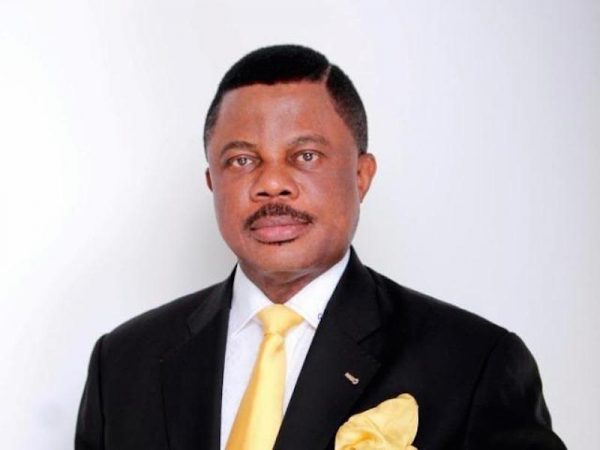Court has released Obiano’s passport for a medical trip amidst the N4bn theft trial.
NewsOnline Nigeria reports that the immediate-past governor of Anambra State, Willie Obiano, on Thursday, failed in his bid to quash the N4bn theft charges filed against him by the Economic and Financial Crimes Commission (EFCC).
Justice Inyang Ekwo of the Federal High Court in Abuja dismissed the preliminary objection filed by Obiano to challenge the powers of the EFCC to try him.
The judge, however, granted Obiano’s prayer for the release of his passport to enable him to embark on a medical trip.
ALSO: Wike, Ortom, G-5 Governors Throw Massive Party Over PDP NEC Meeting Triumph (VIDEO)
Justice Ekwo, while adjourning till June 27 for the commencement of trial, said Obiano must return his passport to the court on his return from the medical trip.
Obiano, who was arraigned on January 24, faces nine counts bordering on theft of Anambra State security votes to the tune of N4bn.
But in a preliminary objection filed through his lawyer, Onyechi Ikpeazu (SAN), the ex-governor contended that the EFCC lacked the power to prosecute him.
He urged the court to, therefore, quash the charges, describing them as an abuse of court process.
Obiano maintained that no prima facie case had been established against him.
But in a ruling on Thursday, Justice Inyang Ekwo said the application lacked merit and therefore dismissed it.
Justice Ekwo said since security vote, which is the crux of the matter, is paid from the Federation Account, the Federal High Court had jurisdiction to entertain the case.
“As long as the EFCC Act has not been declared unconstitutional, this court cannot stop the implementation of the Act.
“The powers of the EFCC ought to be a question of law and have bearing in the 1999 Constitution.
“State security vote comes from the Federation Account, making the development a constitutional issue.
“This court has no powers to preempt the case of the prosecution, “ the judge held.
On the issue of proof of evidence, Justice Ekwo said the Federal High Court is a court of summary jurisdiction in criminal proceedings.
He explained that summary jurisdiction excuses the use of proof of evidence prior to the commencement of trial.
“The submission of proof of evidence by the defendant is mistaken and not applicable in this court,” the judge held.
He also said the appeal filed by the Anambra State government referenced by the defendant had been determined in favour of the EFCC by the Supreme Court.
“I find, at this point, that none of the provisions of the 1999 Constitution (as amended), upon which the applicant relied in his application, has any bearing on this case.
“I make an order dismissing this application,” the judge held.
After the ruling, Ikpeazu moved an application to vary the bail granted to the defendant.
“This is based on the health conditions and medical appointments of the defendant. His treatments usually last 60 days. He will comply with the conditions set by my lord, “ Ikpeazu added.
Counsel for the EFCC, Sylvanus Tahir (SAN), did not oppose the application but expressed reservations about the 60 days Obiano would require for treatment.
Tahir said, “We are not opposed to the application but we have issues with the 60 days. The trial has been truncated already.”
The judge, however, granted Obiano’s prayer and subsequently adjourned till June 24, 25, 26 and 27 June for trial.
The judge ruled: “Prayers 2,3 and 4 are hereby granted. Defendant to return his passport upon his return.”














